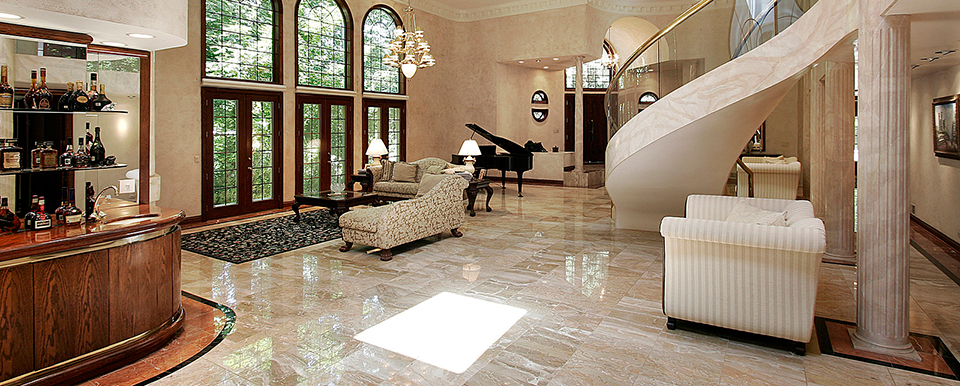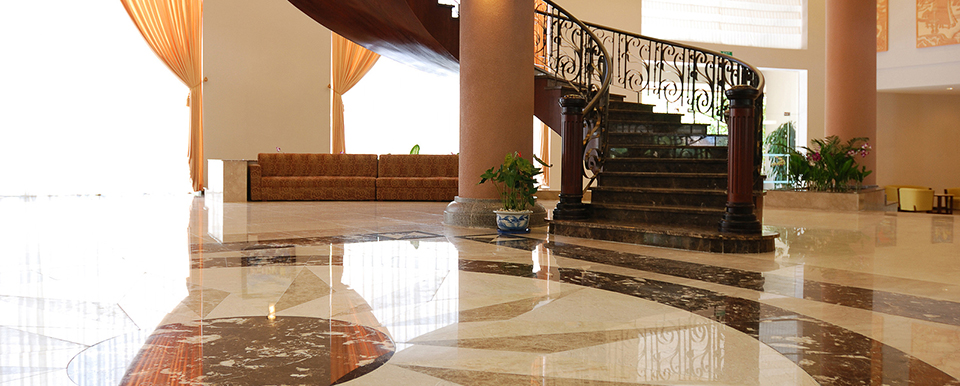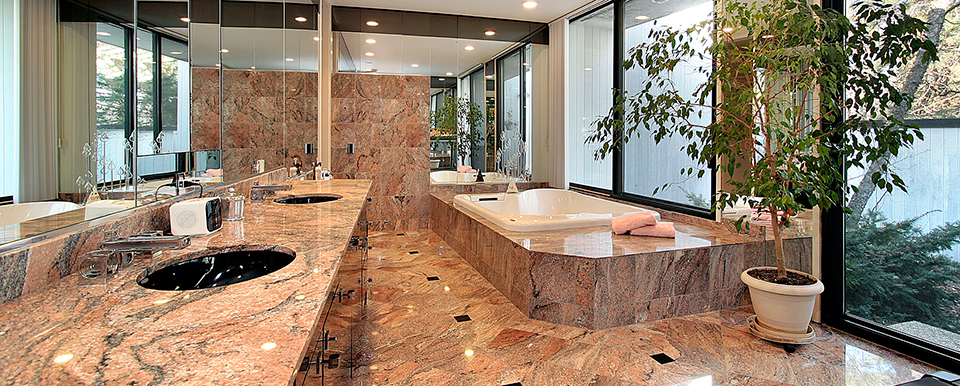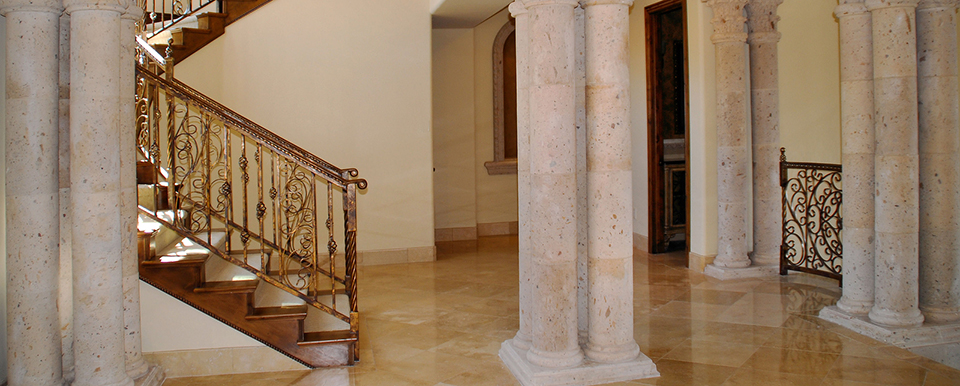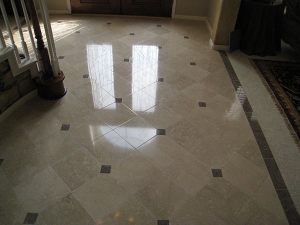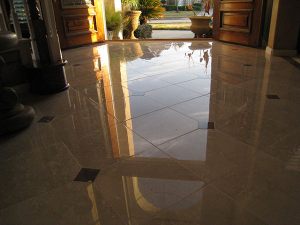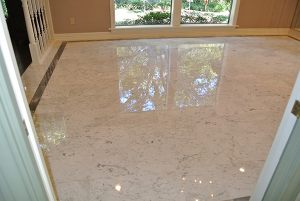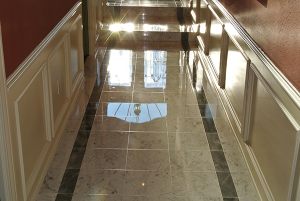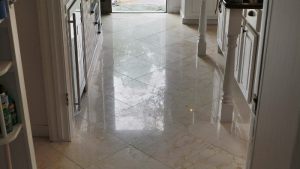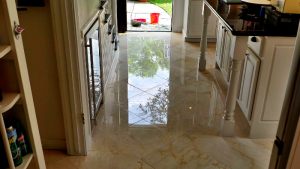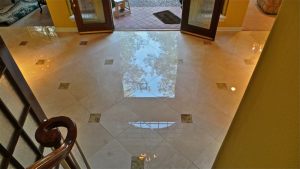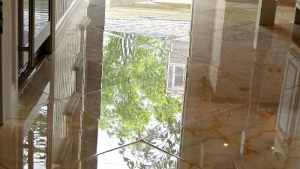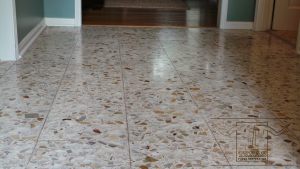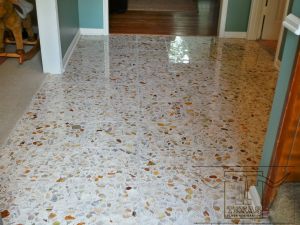GIVE US A CALL Houston 713-306-4822 College Station 832-576-0439 REQUEST A QUOTE
About Our Company
Texas Floor Restoration has long time experience in both residential and commercial restoration and maintenance of all natural stone. We strive to exceed all client expectations by remaining an honest and reliable company. While other companies try to cut corners, recommend unnecessary services, and take advantage of their customers; we believe that a good reputation will sustain Texas Floor Restoration in the long run. Using our high standard craftsmanship to polish , clean and seal your marble , travertine , granite, slate, limestone, ect. to restore your natural stone surfaces back to their original and beautiful appearance.
Texas Floor Restoration is committed to utilizing the most suitable products and latest advances in technology to ensure your natural stone is treated in the most effective and efficient way. We also make sure to continually undergo training to keep updated on current techniques and innovations. Let Texas Floor Restoration take care of all your natural stone needs.
Marble Sealing
Marble Sealers
Whether installing a new floor or restoring an existing floor, it is always important to create a new surface that will retain looking its best for as long as possible. Any natural stone is porous and so, without saying this, without adequate protection it will absorb spilled liquids leading to unsightly stains. Sealing the floor creates a barrier between your floor and most harmful spills. All stone surfaces should be sealed in order to protect them as well to enhance their natural beauty.
At Texas Floor Restoration we know that marble floors are becoming the most popular flooring to be installed in higher end homes. We focus our attention on cleaning, honing, polishing, and sealing marble floors. But that does not mean that's all we have expertise in. We also have expertize in all natural stone floors, countertops, and showers. So for any of your sealing needs in the Houston, College Station and surrounding areas trust the experts at Texas Floor Restoration.
Education on Marble Sealing
Texas Floor Restoration would like to educate you on marble sealing, so you wont be misled by cheap prices and to save you from the consequences of choosing an inexperienced company. You need to stay clear of any sealers that say matte, gloss, shine or enhancer. Stay away from any company or individual that says they can fix all your floors problems with one sealer that is most likely a gimmick and will be very costly to remove later on. As a matter of fact the only sealer you should use on these types of stones are penetrating impregnator sealers.
If you have any questions don't hesitate to contact us at 713-306-4822 or email us using the email contact form on this site at info@texasfloorrestoration.com with your questions or concerns.
Marble Honing
Marble Honining in Houston, College Station and Surrounding Area
Marble Honing
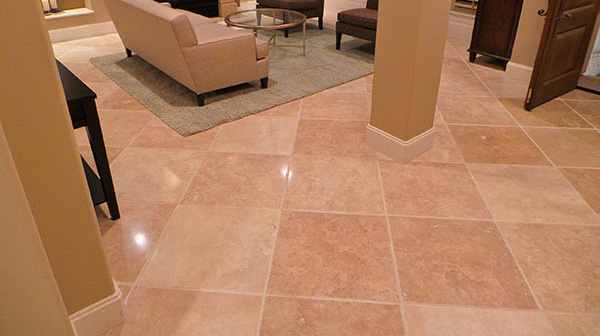
Honing, a form of polishing, is more commonly performed on a Travertine floor. Honing is a lower level polish providing a satin finish. Most Travertine floors come from the factory with that low shine/hone while most Marble floors come from the factory polished dose not mean all marble or Travertine floors have to stay that way. Whether or not your floor has come from the factory polished or honed we can always customize your marble to a honed or polished finish. When your Marble has been worn for several years, and has developed enough surface scratches to dull the surface, or just plain dirty you might be ready for your Marble to be resurfaced.
Marble Honing Processes
Texas Floor Restoration is is able to machine hone your Marble with the use of diamond abrasive pads. This procedure will remove minor scratches and surface abrasions and return the Marble to a like new appearance or in many instances better. If your tired of the honed look you can always choose a polished or higher hone depending upon your tastes and preferences. Marble honing can also be performed with the use of an abrasive compound power also known as ,honing powders and state-of-the-art diamond pads. The most important thing is how you seal your Marble when you're done honing because that's going to keep it looking better for longer.
Do I Need my Marble Refinished?
Over time every floor will need to be refinished, honed or cleaned and if you let it go to far it will need to be replaced. When your Marble has been worn for several years, and has developed enough surface scratches to dull the surface, or just plain dirty you might be ready to have your marble resurfaced. If your reading this chances are your marble need some attention so don't hesitate call today.
If you have any questions don't hesitate to contact us at 713-306-4822 or email us using the email contact form on this site at info@texasfloorrestoration.com with your questions or concerns.
Marble Cleaning Services
Marble Cleaning Services in Houston, College Station and Surrounding Areas :
Marble Cleaning
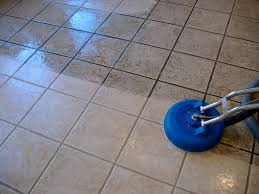
Our marble cleaning typically involves a intensive cleaner that is very effective, but very gentle on the stone. We are very careful not to get the stone too wet, because any floor can be water logged or flooded. This is very important because water and soap can hurt or damage your floor by penetrating too deep.
There are a lot of other companies that will use surface cleaners which are basically a pressure washer with a vacuum. These machines often open up the pores on soft stones, and for that reason we don't recommend using that on your marble floor.
These machines use between 1200-1800psi at 3 gallons per minute, that is way too much water hitting the floor with too much pressure. The vacuum does not stop the water from penetrating the floor and opening up the pores.
Let me give you example that you might understand: If you have ever pressure washed your driveway or concrete you would have noticed little particles of sand all over you and everything around you. Now we can think that it's dirt but the truth is that it's part of the concrete and you are opening up the pours. That's why after cleaning your concrete it gets dirtier faster and faster unless you seal it. This wil also, in the same way, happen to your marble.
Marble Maintenance Services:
Once your marble floors have been professional cleaned and sealed,the floors should not need maintence for between 1-4 year, depending on traffic and proper sealing. We recommend getting your floors professionaly cleaned as needed, and never wait longer than the recommended maximum of 4 years.
Types of Marble Finishes
Marble tiles have become more popular in home flooring, walls, backslpash, pavers, and around the pool. All travertine can look uniquely different due to their different finishes. Some of the most popular finishes are polished (a mirror like shine), tumbled (rough), Brushed (worn or textured suface), or honed (matte). Your Texas Floor Restoration technician will be able to correctly identify which type of travertine you have and can further advise you on how to clean it to bring out it's maximum potential. Each marble is different, and they varry by color, durability, porosity, and density depending on the quarry that they came from. No two marbles are the same so be cautious when a company has a "one size fits all" answer to your floor cleaning plan.
Mistakes We See When Cleaning Marble
Cleaning marble requires special tools, chemicals, sealers, and protectants to prevent scratching, etching, and permanent staining. If your professional DOES NOT have the right tools, chemicals and expertise he could create a scenario for some fairly significant damage to your marble stone. CAUTION: never clean marble with cleaning products containing lemon, bleach, vinegar, or any type of acidic products. Also never use scouring creams and powders. These types of products will etch or scratch marble floors and may require costly marble restoration services to your budget. Also NEVER clean with high alkaline cleaner as they break down the sealer leaving your floors vulnerable to water stains, etch marks, and other stains. We also NEVER Recommend using using OxiClean or Mr.Clean Magic Eraser as a cleaner on any type of natural stone. OxiClean and Mr. Clean Magic Eraser have many beneficial uses but using it to clean your marble is NOT one of them. All our clients receive a comprehansive Stone Care Guide that address these issues.
The next most common mistake we see being made, is that the home owners or their "professional" marble cleaner will use a generic sealer from the local hardware store that leaves the floor with a sticky residue. The reason for that is because your polished, tumbled or honed marble have different porosities. Again one size dot fit all. You will need a sealer that correctly matches your marble needs.
If you have any questions don't hesitate to contact us at 713-306-4822 or email us using the email contact form on this site at info@texasfloorrestoration.com with your questions or concerns.
Marble Polishing
Marble Polishing Houston, College Station, The Woodlands, Katy Texas
Marble Polishing Services:
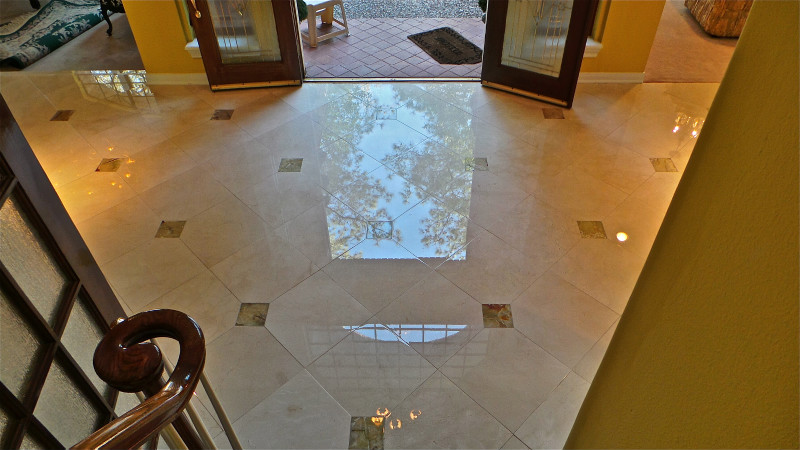
Marble polishing processes can be very controversial because of the many different ways to polish marble and the different techniques used by many contractors. What technique is the best, and who can I trust? I'm going to address the different ways marble can be polished.
The most popular one is acid polishing with steel wool most commonly known as crystallization or vitrification. This process is not recommended by Texas Floor Restoration for reasons (showen or stated) in the video on the homepage.
Another populur marble polishing process is diamond polishing. With hard diamonds and pads. Diamond polishing which is basically running a very fine grit diamond with water until you receive the desired polish. this alone is not recommended by Texas Floor Restoration, as a much better result can be acheived with our technology.
Another popular system for polishing Marble is with polishing powders, or pastes. These pastes and powders are very complex with alot of different components, but to simplify it, these powders are very abrasive and acidic and when used correctly they can yeild good results. This alone is not recommended byTexas Floor Restoration, as a much better result can be acheived with our technology.
At Texas Floor Restoration we are trained to polish with all the above technologies, and techniques. We recommend using a combination of diamond polishing, with a unique powder we have developed that works with diamond polishing. We don't feel that one polish gives all the benifits that we can give by using this superiorcombination approach.
How to Polish Marble
To polish marble you must start off with a Clean floor. The next step is to evaluate the marble to see how badly the floor is scratched or etched and the overall "health" of the floor. WE then can determine how deep we must go with the diamond grindind. Typically most floors will start off with a #200 diamond and then proceed with the next steps #400-#600-#800-#1800-#3000-#6000 diamonds (Every system is different this is just a generic example). After running all the needed diamond gritss we can start with polish if more shine is desired. After cleaning, grinding, and polishing is done then we will need to seal the floor with a penetrating sealer to complete the job.
What is Marble?
Marble is a rock resulting from the metamorphism of sedimentary carbonate rocks, most commonly limestone or dolomite rocks. Metamorphism causes variable recrystallization of the original carbonate mineral grains. Marble comes in many different colors and designs. Pure white marble is the result of metamorphism of a very pure limestone. The characteristic swirls and veins of many colored marble varieties are usually due to various mineral impurities such as clay, silt, sand, or chert which were originally present as grains or layers in the limestone. Another type of marble, green marble, is often due to serpentine resulting from originally high magnesium limestone or dolostone with silica impurities. These various impurities have been mobilized and recrystallized by the intense pressure and heat of the metamorphism. Construction marble is a stone which is composed of calcite, dolomite or serpentine which is very easily polished. Marble is a stone that many cultures use to show status or wealth. Marble is a gorgeous stone than can transform any room to elegance. Whether you have a new marble floor that you want to keep its luster or an older marble floor than you want restored to that brand new shine; Texas Floor Restoration knows marble.
If you have any questions don't hesitate to contact us at 713-306-4822 or email us using the email contact form on this site at info@texasfloorrestoration.com with your questions or concerns.

